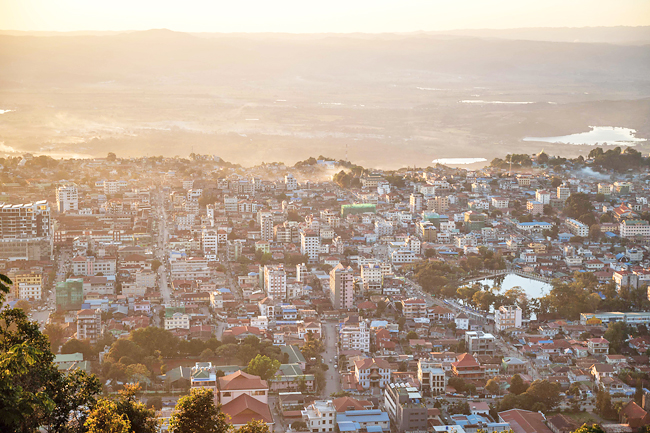AP – Myanmar’s desperate military junta is ramping up attacks on villages that have fallen to opposition groups, carrying out beheadings, gang rapes and torture, with women, children and the elderly among the victims, the United Nations (UN) independent human rights investigator for Myanmar said in a new report.
Thomas Andrews, a former United States (US) congressman from Maine, said in the report to the UN General Assembly that the junta has responded to military defeats and the loss of territory by using sophisticated weapons against civilians and seeking to destroy towns that it cannot control.
Calling Myanmar “an invisible crisis” because the world’s attention is focused elsewhere, he said, “Escalating atrocities against the people of Myanmar are being enabled by governments that allow, or actively support, the transfer of weapons, weapons materials, and jet fuel to junta forces.”
Andrews didn’t name the governments. But he praised Singapore for cracking down on weapons transfers that has led to a 90 per cent reduction by Singapore-registered companies, and said sanctions imposed by the US on junta-controlled, state-owned banks have disrupted military supply chains.
The UN special rapporteur on human rights in Myanmar lamented, however, that their actions remain an exception.

He called on all countries to address Myanmar’s “devastating human rights and humanitarian crisis” by stopping the flow of weapons to the junta, stepping up humanitarian aid to millions in need, and supporting efforts to hold perpetrators accountable for human rights violations.
Myanmar is racked by violence that began when the army ousted the elected government of Aung San Suu Kyi in February 2021 and brutally suppressed nonviolent protests. That triggered armed resistance and combat across the country, with the military increasingly using airstrikes to counter the opposition and secure territory.
The army is on the defensive against ethnic militias in much of Myanmar as well as hundreds of armed guerrilla groups collectively called the People’s Defense Forces, formed to fight to restore democracy.
The military has said in the past that it only attacks legitimate targets of war and has accused the resistance forces of being terrorists.
Andrews called the military junta’s plan to hold an election in late 2025 “a farcical parody” and “thinly veiled attempt to create an impression of legitimacy and relieve international pressure”. He warned, “Not only is this fraudulent attempt outrageous, it is dangerous, as it could lead to even greater levels of instability and violence.”
He ticked off grim statistics: Over 3.1 million people are displaced by conflict and the junta’s human rights violations, and 18.6 million people need humanitarian assistance, including 13.3 million facing emergency levels of food insecurity.
He said the junta’s military forces have killed more than 5,800 civilians, destroyed over 100,000 homes and other civilian structures, and have kept more than 21,000 political prisoners languishing behind bars.
“Junta troops have killed civilians in ground assaults, including the mass killing of individuals already in the custody of junta forces,” Andrews said. “Victims have been tortured, raped and beheaded, and their bodies burned.”
Andrews, a human rights fellow at Yale Law School who was appointed by the Geneva-based Human Rights Council, said the situation was most “desperate and dangerous” in Rakhine state in western Myanmar. Last November, the Arakan Army, which is seeking autonomy from Myanmar’s central government, began an offensive against the military in Rakhine and has gained control of more than half of its townships. The Arakan Army, which is the well-armed wing of the Rakhine ethnic minority movement, is also a member of the armed ethnic group alliance trying to topple the military.
In the report, Andrews said: “The Arakan Army has been implicated in grave human rights abuses, including indiscriminate attacks, killings, sexual violence and arbitrary arrests.”
He also said the military has responded to the Arakan Army’s steady losses in Rakhine by attacking civilians and raising tensions between the ethnic Rakhine and Rohingya communities.




